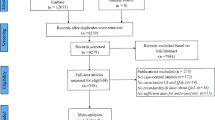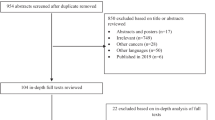Abstract
Objective
To evaluate the efficacy and feasibility of utilizing Traditional Chinese Medicine (TCM) combined group psychotherapy intervention on psychological distress management and gut micro-biome regulation for colorectal (CRC) survivors.
Methods
A single-arm phase I clinical trial was conducted between December 2020 and December 2021 in Xiyuan Hospital and Beijing Cancer Hospital in China. Inclusion criteria included stage I–III CRC survivors after radical surgery with age between 18 and 75. The intervention was a 6-week online TCM combined group psychotherapy intervention including 90-min communication, TCM lifestyle coaching, self-acupressure guidance, and mindfulness practice led by TCM oncologist and psychiatrist each week. Outcomes were measured by Self-rating Anxiety Scale (SAS), Self-rating Depression Scale (SDS), Fear of Cancer Recurrence Inventor (FCRI), and Quality of Life Questionnaire (QLQ-C30). Fecal samples before and after intervention were collected for 16Sr RNA analysis.
Results
We recruited 40 CRC survivors and 38 of them finally completed all interventions with average age of 58±13 years’ old. Paired t-test showed that SAS at week 2(35.4±5.8), week 4 (37.9±10.5) and week 6 (31.3±6.4) during the intervention was significantly lower than baseline (42.1±8.3, p<0.05 respectively). SDS score also declined substantially from baseline (38.8±10.7) to week 2 (28.3±8.8, p<0.001) and week 6 (25.4±7.7, p<0.001). FCRI decreased from 19.4±7.2 at baseline to 17.5±7.1 at week 4 (p=0.038) and 16.3±5.8 at week 6 (p=0.008). Although changes of QLQ-C30 were not statistically prominent, symptom burden of insomnia and fatigue significantly alleviated. The abundances of gut microbiota Intestinibacter, Terrisporobacter, Coprobacter, and Gordonibacter were all significantly elevated after intervention.
Conclusions
TCM combined group psychotherapy intervention is feasible and effective to reduce CRC survivors’ psychological distress and modulate certain gut bacteria which might be associated with brain-gut axis effect. It is necessary to carry out with phase II randomized controlled clinical trial.


Similar content being viewed by others
Data Availability
The data that support the findings of this study are available from the corresponding author upon reasonable request.
References
Siegel RL, Miller KD, Jemal A (2020) Cancer statistics, 2020. CA Cancer J Clin 70(1):7–30
Siegel RL et al (2020) Colorectal cancer statistics, 2020. CA Cancer J Clin 70(3):145–164
Cao W et al (2021) Changing profiles of cancer burden worldwide and in China: a secondary analysis of the global cancer statistics 2020. Chin Med J (Engl) 134(7):783–791
McGeechan GJ et al (2022) A systematic review and qualitative synthesis of the experience of living with colorectal cancer as a chronic illness. Psychol Health 37(3):350–374
Boehmer U et al (2022) Anxiety and depression in colorectal cancer survivors: Are there differences by sexual orientation? Psychooncology 31(3):521–531
Smith TG et al (2019) Perceptions of patients with breast and colon cancer of the management of cancer-related pain, fatigue, and emotional distress in community oncology. J Clin Oncol 37(19):1666–1676
Russell L et al (2015) Psychological distress, quality of life, symptoms and unmet needs of colorectal cancer survivors near the end of treatment. J Cancer Surviv 9(3):462–470
Renna ME et al (2022) Depression and anxiety in colorectal cancer patients: Ties to pain, fatigue, and inflammation. Psychooncology 31(9):1536–1544
Scherer-Trame S et al (2022) Quality of life, distress, and posttraumatic growth 5 years after colorectal cancer diagnosis according to history of inpatient rehabilitation. J Cancer Res Clin Oncol 148(11):3015–3028
Trudel-Fitzgerald C, Tworoger SS, Zhang X, Giovannucci EL, Meyerhardt JA, Kubzansky LD (2020) Anxiety, depression, and colorectal cancer survival: results from two prospective cohorts. J Clin Med 9(10):3174
Orive M et al (2022) Anxiety, depression, health-related quality of life, and mortality among colorectal patients: 5-year follow-up. Support Care Cancer 30(10):7943–7954
El-Shami K et al (2015) American Cancer Society colorectal cancer survivorship care guidelines. CA Cancer J Clin 65(6):428–455
NCCN (2022) The NCCN colon cancer clinical practice guidelines in oncology (version 1.2022). NCCN, Fort Washington [2022-02-25]
Powers-James C et al (2022) Frequencies and predictors of health psychology referrals after integrative oncology consultation. Support Care Cancer 30(8):6963–6972
Nayak H et al (2022) The use of integrative medical services to address psychological concerns around infertility in an Indian academic medical centre. J Hum Reprod Sci 15(2):171–176
Fong TCT, Ho RTH (2020) Mindfulness facets predict quality of life and sleep disturbance via physical and emotional distresses in Chinese cancer patients: A moderated mediation analysis. Psychooncology 29(5):894–901
Johns SA et al (2016) Randomized controlled pilot trial of mindfulness-based stress reduction for breast and colorectal cancer survivors: effects on cancer-related cognitive impairment. J Cancer Surviv 10(3):437–448
Haller H et al (2021) Effects of an integrative mind-body-medicine group program on breast cancer patients during chemotherapy: an observational study. Curr Pharm Des 27(8):1112–1120
Mao JJ et al (2022) Integrative oncology: Addressing the global challenges of cancer prevention and treatment. CA Cancer J Clin 72(2):144–164
Toledano A et al (2021) Integrative oncology: an international perspective from six countries. Integr Cancer Ther 20:15347354211004730
Sun L et al (2017) Do perceived needs affect willingness to use Traditional Chinese Medicine for survivorship care among chinese cancer survivors? A cross-sectional survey. J Glob Oncol 3(6):692–700
Zhao L et al (2015) Effect of chronic psychological stress on liver metastasis of colon cancer in mice. PLoS One 10(10):e0139978
Ma J et al (2022) Cerebral metabolic analysis of patients with colorectal cancer and chronic enteritis: inquiry into gut-brain crosstalk. Front Neurosci 16:822891
Chen T et al (2021) Akkermansia muciniphila protects against psychological disorder-induced gut microbiota-mediated colonic mucosal barrier damage and aggravation of colitis. Front Cell Infect Microbiol 11:723856
Mujagic Z et al (2022) Integrated fecal microbiome-metabolome signatures reflect stress and serotonin metabolism in irritable bowel syndrome. Gut Microbes 14(1):2063016
Wang ZCY (1984) Self-rating anxiety scale (SAS). Shanghai Arch Psychiatry 2:73–74
Su T, Liu HX, Tian J, Deng ZZ, Wang ZL (2018) Revision and reliability and validity test of Chinese version of cancer recurrence fear scale. Chinese J Pract Nursing 34(20):1571–1576
Chie WC, Chang KJ, Huang CS, Kuo WH (2003) Quality of life of breast cancer patients in Taiwan: validation of the Taiwan Chinese version of the EORTC QLQ-C30 and EORTC QLQ-BR23. Psycho-oncology 12:729–735
Dong X et al (2019) Telephone-based reminiscence therapy for colorectal cancer patients undergoing postoperative chemotherapy complicated with depression: a three-arm randomised controlled trial. Support Care Cancer 27(8):2761–2769
Li J, Luo, X, Li Q (2021) An implementation process evaluation based on an integrated psychosocial support program of colorectal cancer couples in China: a pilot study. Healthcare (Basel, Switzerland) 9(2):110
Butow P et al (2018) Fear of cancer recurrence: a practical guide for clinicians. Oncology (Williston Park) 32(1):32–38
Hall DL et al (2019) Fear of cancer recurrence: a model examination of physical symptoms, emotional distress, and health behavior change. J Oncol Pract 15(9):e787–e797
Deleemans JM et al (2022) The chemo-gut pilot study: Associations between gut microbiota, gastrointestinal symptoms, and psychosocial health outcomes in a cross-sectional sample of young adult cancer survivors. Curr Oncol 29(5):2973–2994
Gonzalez-Mercado VJ et al (2021) Gut microbiota and depressive symptoms at the end of CRT for rectal cancer: A cross-sectional pilot study. Depress Res Treat 2021:7967552
Zhang H et al (2022) Assessing the joint effects of brain aging and gut microbiota on the risks of psychiatric disorders. Brain Imaging Behav 16(4):1504–1515
Zhang Q et al (2021) Gut microbiome composition associated with major depressive disorder and sleep quality. Front Psychiatry 12:645045
Ayyoubzadeh SM et al (2020) Supporting colorectal cancer survivors using eHealth: a systematic review and framework suggestion. Support Care Cancer 28(8):3543–3555
Acknowledgements
We appreciate all patients and their caregivers for participating our study by sharing their own experiences and feelings with us. It was very touching moment when people were willing to tear their wounds again to support other peers. We also thank physicians and research assistants in Xiyuan Hospital and Beijing Cancer Hospital for their help on patients’ recruitment and management.
Funding
This study is funded by Scientific and Technological Innovation Project of China Academy of Chinese Medical Sciences, grant number: C12021A01819 (principal investigator: Lingyun Sun MD); Colorectal Cancer Project of Clinical Cooperation of TCM and Western Medicine for Major Difficult Diseases of Family Administration of Traditional Chinese Medicine (grant number: 070030003); National Natural Science Foundation of China, Youth Program(grant number: 82004191).
Author information
Authors and Affiliations
Contributions
All authors contributed to the study conception and design. Material preparation, data collection and analysis were performed by Lingyun Sun, Ying Pang, Jiaxiliu and Rongyan Peng. The first draft of the manuscript was written by Lingyun Sun and Ying Pang, and all authors commented on previous versions of the manuscript. All authors read and approved the final manuscript.
Corresponding author
Ethics declarations
Ethics approval
The Ethic Board of Xiyuan Hospital approve the study protocol(2020XLA048-2).
Consent to participate
All patients consented to participate.
Consent for publication
All authors consented to publish the current manuscript.
Competing interests
The authors declare no competing interests.
Additional information
Publisher’s note
Springer Nature remains neutral with regard to jurisdictional claims in published maps and institutional affiliations.
Supplementary information
ESM 1
(DOCX 17 kb)
Rights and permissions
Springer Nature or its licensor (e.g. a society or other partner) holds exclusive rights to this article under a publishing agreement with the author(s) or other rightsholder(s); author self-archiving of the accepted manuscript version of this article is solely governed by the terms of such publishing agreement and applicable law.
About this article
Cite this article
Sun, L., Pang, Y., Wang, Z. et al. Effect of traditional Chinese medicine combined group psychotherapy on psychological distress management and gut micro-biome regulation for colorectal cancer survivors: a single-arm phase I clinical trial. Support Care Cancer 31, 698 (2023). https://doi.org/10.1007/s00520-023-08131-5
Received:
Accepted:
Published:
DOI: https://doi.org/10.1007/s00520-023-08131-5




